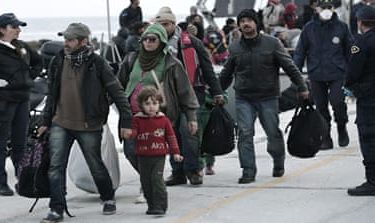Exile instead of murder: A Syrian refugee’s choice
Refusing to kill civilians for Assad, policeman escaped Syria for a life of nostalgia and separation in Germany.

Braunschweig, Germany – Ammar Kassir became a refugee to avoid killing fellow Syrians.
In 2012, as pro-democracy marches on the streets of Damascus were increasing, Kassir was a part of a police unit working under the direct control of President Bashar al-Assad. One afternoon, he was ordered to open fire on protesters marching for democracy.
Keep reading
list of 4 itemsThe Take: Thirteen years later, has the world forgotten Syria?
Jordan army kills drug runners at Syria border amid soaring Captagon trade
Assad arrest warrant: ‘Hope and pain’ for Syrian chemical attack survivors
“Assad told us we must kill these people who are making demonstrations. The protesters were shouting ‘Freedom! Freedom!’, and he said we must kill these people. I did not want to do that,” Kassir told Al Jazeera.
Assad told us we must kill these people who are making demonstrations... I did not want to do that.
The safe choice would have been to follow the orders he was given. The policeman, who was 20-years old at the time, chose to resist, even though he knew refusing orders meant he would have to escape for his own safety.
Kassir became a refugee, one of three million Syrians who have fled their country in the past three years.
He left Damascus, heading north to his family’s home in Idlib. From there, he made his way alone to Turkey, crossing the border by foot.
Since the Syrian uprising began, 95 percent of the Syrians who fled their native country remained in the region, mainly in Lebanon, Jordan, and Turkey.
Kassir had other plans.
He wanted to get to Europe, to reach a safer country that would give him a chance to restart his life.
Smuggle to survive
Legal pathways to Europe for Syrian refugees are rare and Kassir – like many other Syrians who sought refuge in Europe – was forced onto dangerous and expensive smuggling routes.
He paid 3,000 euros ($3,400) to board a small fishing boat, together with 15 other refugees, that crossed the Aegean Sea overnight and brought the asylum-seekers to Greece.
He then paid another 7,000 euros ($7,900) for a fake passport and plane tickets that would eventually land him in Germany, where he applied for asylum in April 2013.
Kassir, now 23, lives in Braunschweig, a small city, 230km west of the capital Berlin.
His younger brother followed his footsteps and made the trip from Syria to Braunschweig.
Kassir’s mother and two sisters are taking refuge in Turkey, and the family stays in contact through phone calls. He said he feels thankful to his host country.
“I find Germany to be a fair country. You have rights,” Kassir said. “You feel you are human here in Germany, not an animal.”
![Ammar Kassir, 23, a Syrian refugee, wants to make a new life in Germany [Yermi Brenner/Al Jazeera]](/wp-content/uploads/2015/02/b5e4c7493bb949d8ac350e994106209d_18.jpeg)
Germany is currently the most popular Western destination for asylum seekers. A total of 202,834 asylum applications were filed with Germany’s Federal Office for Migration and Refugees in 2014, an increase of about 60 percent compared to the previous year.
One-fifth of the asylum applicants were Syrians. Overall, Germany has admitted more than 80,000 Syrian refugees, including 25,000 through resettlement programmes.
Kassir said he feels welcome in Germany, but he misses the sensation of walking the streets of Syria – before the war began that is. That feeling, he said, cannot be replicated in Braunschweig.
“In Syria, all the people in the street are your family. When you go outside of your home you find your brother, your cousin, your uncle. Everybody is family,” Kassir said.
“Here in Germany, I get my rights, but I feel I am not from Germany. You feel you are not German and it is not your country.”
Back to his roots
Kassir worked for year in a restaurant kitchen in Braunschweig “making pizzas and so on”.
He did not like it. He said he wants to have a more meaningful job. His German is improving, and now he plans to start studying full-time and master the language. His dream is to go to school and later work in the profession he had in Syria.
“I want to be a policeman in Germany,” he said. “But I need to get permanent residency first.”
Legal refugees in Germany who have temporary residence can apply for permanent residence after three years.
Kassir said he sees his future in Germany, though his thoughts are often focused on his homeland.
“Germany is a beautiful country and it has been very good for me, but I cannot forget Syria,” he said, adding one of the things he misses most is the smell of the earth – of the land – in Syria.
“Before she’s my country, Syria is my mother,” he said. “Nobody can forget his mother.”
Follow Yermi Brenner on Twitter: @yermibrenner